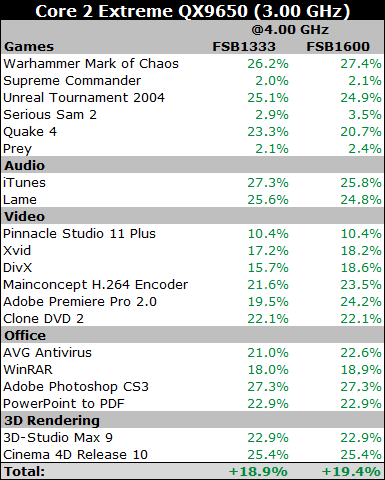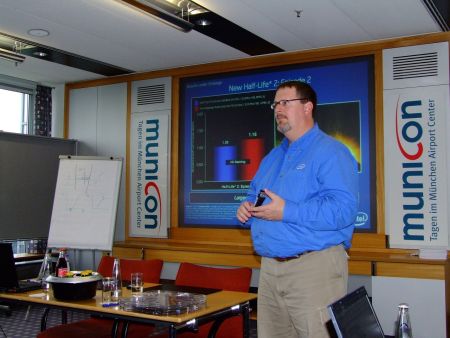Intel's 45 nm Penryn CPU: 4 GHz Air Cooled
Overclocking To 4.0 GHz - FSB1600 Offers No Advantage
The Core microarchitecture was designed in such a way as to only need to access the main memory very rarely; this is achieved by letting the processor load data speculatively. The larger 12 MB L2 Cache (2 x 6 MB) reduces the processor's dependence on the RAM even further.
This is why increasing the speed of the northbridge (which contains the memory controller) by about 25% to 400 MHz (1600 QDR) has practically no impact. A performance increase of 0.5% across our benchmark suite compared to FSB1333 is completely unnoticeable to any user.
Thus, the only thing a higher FSB will get you is a minor increase in power consumption by the northbridge as well as potential instabilities on the P35 and X38 chipsets, neither of which officially supports FSB1600.
At least in the desktop segment, it is obvious that FSB1600 will be offered more for marketing potential than actual performance benefits.
At Intel's "Meet the Penryn Experts" event in Munich, an Intel representative confirmed this by saying "On the desktop, I don't think FSB makes a difference". Nonetheless, it has become known that FSB 1600 processors, which will require the new X48 chipset, will be released next year.
A clear statement from Intel - FSB 1600 provides no benefits.
Running at 4.0 GHz, our processor was able to gain up to 19% more performance in our benchmark suite. However, the high voltages needed to ensure stable operation prevent this performance advantage from being used over extended periods of time.
Get Tom's Hardware's best news and in-depth reviews, straight to your inbox.
For our tests, we used DDR2-800 memory running at the JEDEC-specified latencies of CL 4.0-4-4-12.
Current page: Overclocking To 4.0 GHz - FSB1600 Offers No Advantage
Prev Page Overclocking - Up To 19% More Performance Next Page Sensational: Idle Power Consumption Of Only 3.79 WattsTom's Hardware is the leading destination for hardcore computer enthusiasts. We cover everything from processors to 3D printers, single-board computers, SSDs and high-end gaming rigs, empowering readers to make the most of the tech they love, keep up on the latest developments and buy the right gear. Our staff has more than 100 years of combined experience covering news, solving tech problems and reviewing components and systems.


